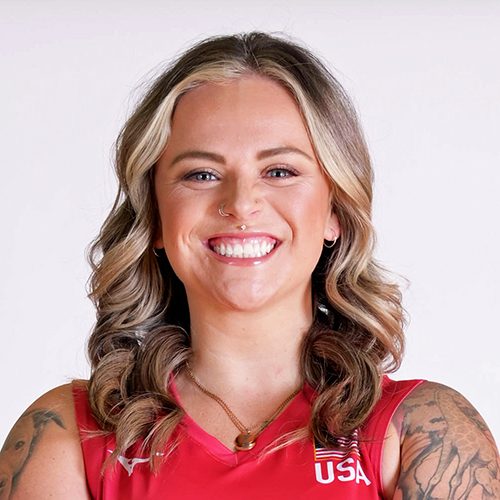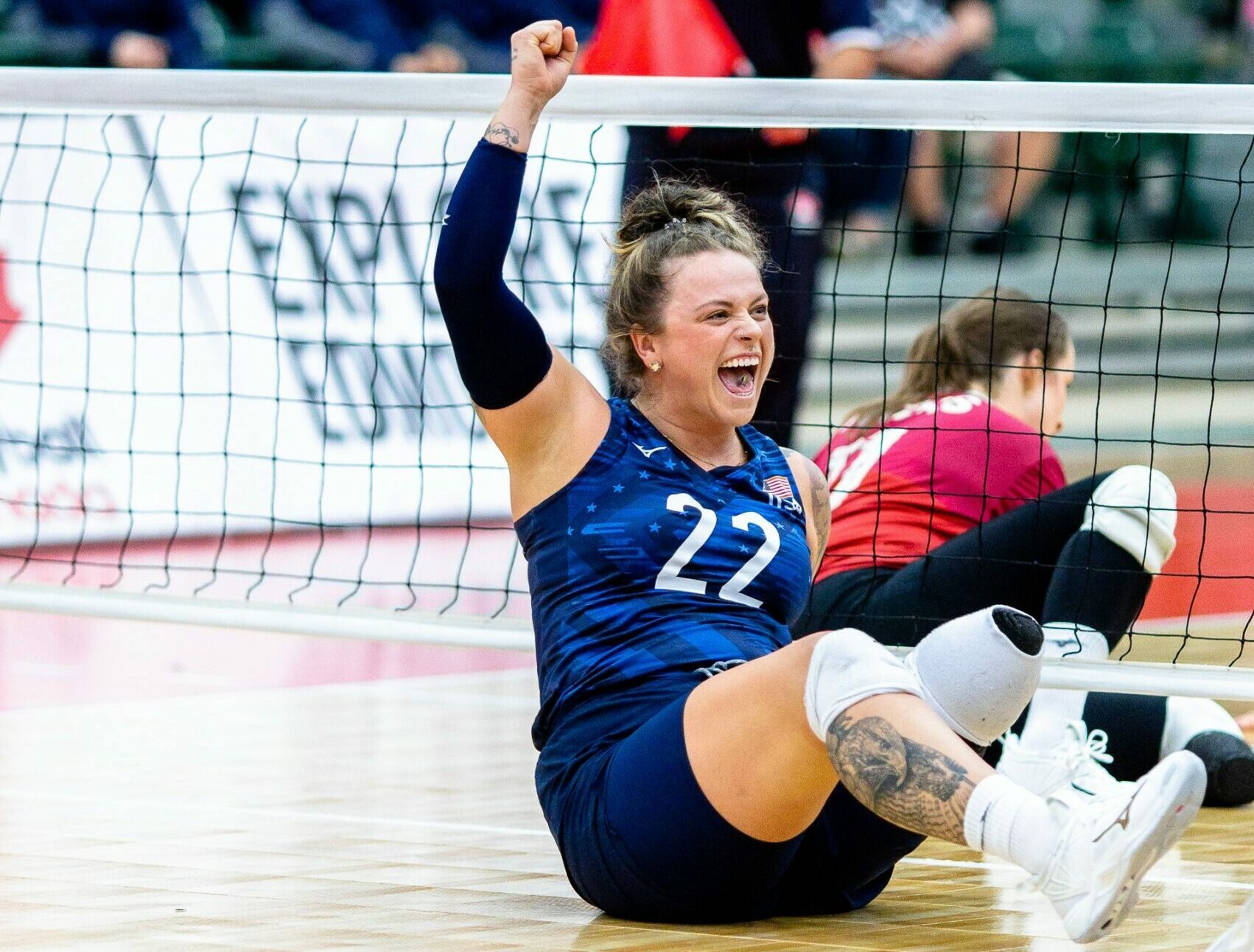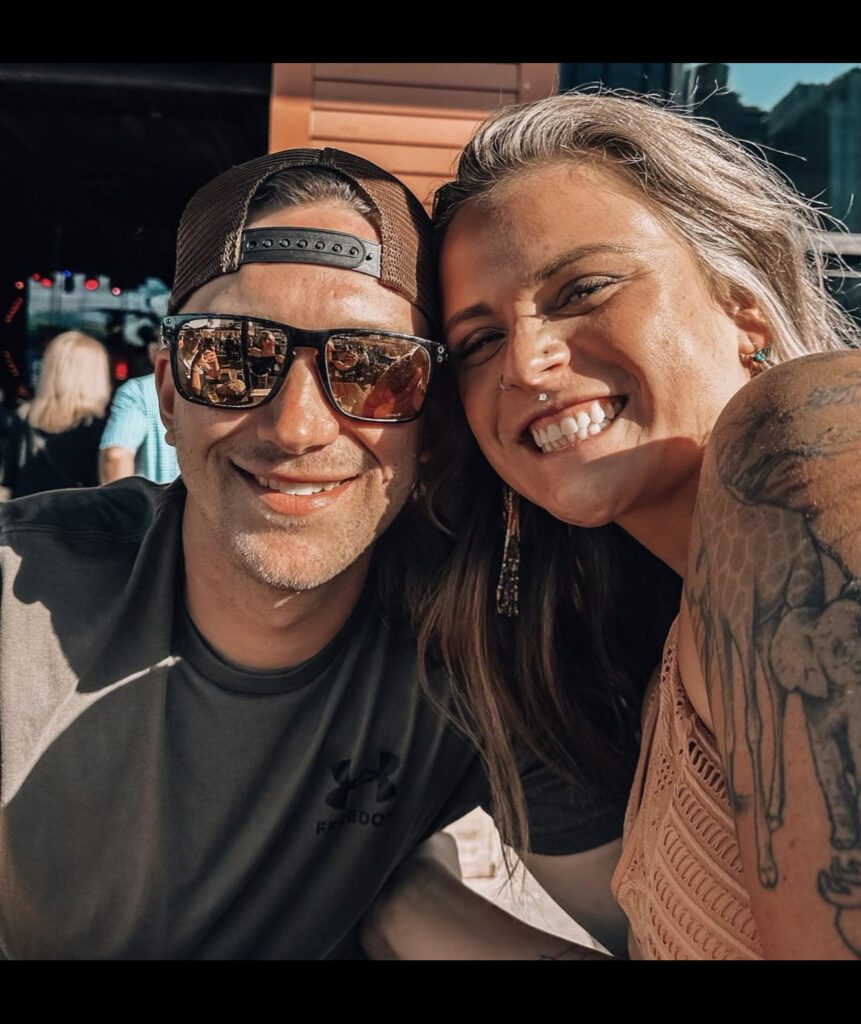
MaKenzie Franklin
Outside Hitter, 6-0
Resources for
Follow USAVolleyball

U.S. Women’s National Sitting Team’s MaKenzie Franklin has taken on one challenge after another since having one of her legs amputated after a motorcycle accident.
In addition to her volleyball training, she is now preparing to join a team of amputees, veterans, athletes and humanitarians who will climb one of Ecuador’s highest glacier-covered volcanoes, the 18,996-foot volcano Cayambe. The climb, scheduled for late September, is organized by the Range of Motion Project (ROMP), a nonprofit organization that provides high-quality prosthetic care to those who do not have access.
“I was reached out to by ROMP about the climb, told there was one spot remaining and invited to a meeting that night. I joined the call, saw that my schedule was open for the climbing dates, and figured I must have to do it. I quickly fell in love with the idea of it,” Franklin recounted. “I have never climbed any mountain, much less one that is 19,000 feet. I didn’t even hike during training in Colorado. I’ve only climbed a bluff.”
Volleyball and the Accident
Franklin played volleyball throughout high school in Red Wing, Minn., and began playing in college at Bemidji State University.
“I was there for about three weeks, but my mother was diagnosed with cancer, so I needed to be home. Having also torn the labrum in my shoulder, I mostly played co-ed and fun league volleyball after that,” she remarked. “I stayed in the sport, having coached ever since I graduated high school and playing some competitive volleyball until the accident.”
On Sept. 13, 2020, Franklin and her boyfriend Devon Wittman were involved in the motorcycle accident that changed her life forever. She used her Apple Watch to call 911 while using her hands as a tourniquet on her groin where her femoral artery was lacerated. After two weeks of multiple surgeries at the Mayo Clinic in Rochester, Minn., her medical team determined the best course of action was to remove her left leg above the knee.

She acknowledges she didn’t know about sitting volleyball at the time.
“About 4-6 months after the accident, I started wondering if there was a way for me to still play volleyball. I researched it and found out there was a sitting team. I discovered the U.S.A. had the best sitting team in the world, so I decided I had to pursue it,” she recollected.
Franklin worked hard to earn a spot on the U.S. Women’s Sitting National team and made her official team competitive debut at the ParaVolley Pan America Zonal Championship in May 2023 in Edmonton, Alberta, Canada, when the U.S. clinched its berth to the 2024 Paralympic Games in Paris.
“I never realized how much volleyball was a part of my life even though I wasn’t playing in college. I love being able to still play and compete at a high level,” she described. “To be able to compete on the national stage is kind of mind-blowing.”
The main adjustment for her as a sitting player compared to her standing playing days is the timing.
“I had the volleyball smarts of where to be at what time. In sitting, you have to turn that up by 25 million times. The ball is low and coming faster,” she explained. “I have to determine how I am going to get to the spot I need to be in so fast.”
Training for Volleyball and Climbing
“Volleyball has been so busy the last four months. It has given me an up on working out for the climb. We just started our workouts back up with two days of skills and two days of strength training.”
She has been walking as much as she can, which she says has been getting easier.
“Up until a few months ago, I was still getting new sockets regularly and walking was a challenge. I would have one good week and then one challenging week,” she said. “The last three months have been a lot better. I walk downhill to the gym and uphill to get back home.”

She noted the most challenging part of exercising for her as an amputee is getting cardio in.
“I try to do as much as possible, but it is extremely difficult. I used to love running but having a running blade is not my favorite thing,” she said. “You need to really trust the blade, and I am slowly getting used to that.”
Franklin recently met with her prosthetist about getting a climbing foot.
“I have been diving into that possibility. I spoke with a veteran climber who said that he wished he had gotten it before he did,” she explained. “Being an above-the-knee amputee makes climbing a bit more challenging, so I am hoping to get the climbing foot soon and begin learning how to use it.”
Living Each Day Fully
“I’m not sure I have wrapped my head around my new life yet,” Franklin admitted. “In the morning, I wake up and think, ‘This is actually what I am doing. I am an amputee doing big things.’ Even before my leg was amputated, I knew I was getting a second chance to do everything I could possibly do, and I made a promise to myself to do just that. I am living one second at a time and have been on the go since.”
That is an understatement. Franklin is also a Certified Veterinary Technician (CVT) who works at an animal emergency hospital, and since her amputation she has also earned her realtor’s license.
“My brother-in-law is a realtor and I decided I want to give that a try, too. It is crazy busy and demanding, but very rewarding to help people. I believe you have to make time for the things you care about, to make sure your schedule is done correctly so you can dedicate yourself 110 percent to the things you want to do,” she responded to the question of how she fits so much into her life.

She doesn’t have to look far to see someone who has fought through adversity and come back even stronger. Her mother was diagnosed with cancer for a second time in 2020, this time with breast cancer.
“She had a double mastectomy the day after my amputation, but she came to see me every day. No matter what struggles she has faced, she always has a smile,” Franklin pointed out.
Her advice to others who have undergone traumatic, life-changing injuries like hers is about making a conscious decision.
“You have two choices in that moment. One is to sit and dwell on it, cry and feel bad for yourself, and do that for the rest of your life,” she stated. “The other is to use the moment to accelerate your motivation. You can do what you did previously, but now in a way that is even cooler and that not everyone can do.”
“You need to continuously check in on yourself and how you are doing. It will get way harder before it gets easier. There will be some hard days and that is where you keep going, not just as an amputee, a real estate agent, or whatever else you are doing,” she continued. “I wake up early every day and take care of myself, so I can continue to be an athlete, CVT, friend, girlfriend and daughter.”